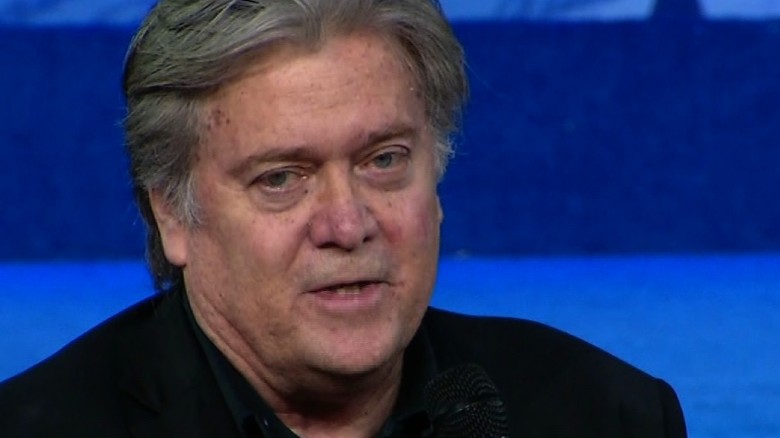It’s easy to forget, after an whirlwind 82 days in the White House, that chief strategist Steve Bannon only formally joined Donald Trump’s presidential campaign fewer than three months before Election Day.
For Trump, however, the timeline is crystal clear. He is keenly aware of when Bannon joined the team and, more to the point, how far he’d gone without him.
“I like Steve,” the President told the New York Post on Tuesday, “but you have to remember he was not involved in my campaign until very late.”
Trump in the same breath went on to list his pre-Bannon accomplishments and remind the world, “I’m my own strategist,” making clear what many had suspected — that the former Breitbart executive is on the presidential chopping block. Bannon picked the wrong rival in Trump son-in-law Jared Kushner, also a top adviser, and it’s become expressly clear that if the two can’t, as Trump said, “work this out,” Bannon will be the one who pays.
The prospect of Bannon’s dismissal will bring unalloyed joy to Democrats and the anti-Trump resistance, who view him as an right-wing extremist with a direct line to the Oval Office, and no small measure of relief to moderate Republicans turned off by his ideological aversion to most forms of American engagement overseas.
All of which begs the question: What becomes of Trump and his administration if the Bannon gets the boot?
The emerging wisdom is that Bannon’s departure would set off a centrist drift, with aides like daughter Ivanka Trump, Kushner and former Goldman Sachs No. 2 Gary Cohn, Trump’s top economic adviser, leading the way. Firebrands like Stephen Miller, one author of the initial travel ban, would be sidelined or dismissed.
By this logic, Trump, too, would moderate. Tweets aside, he might be more inclined to engage the establishment, whether that means seeking some kind of bipartisan consensus on trade or getting in the trenches with House Speaker Paul Ryan and fighting for more familiar GOP policies.
It would be, in short, the “pivot” that so many conservatives in Washington have clamored for and hopefully anticipated since it became clear Trump would be the GOP nominee.
There is a concern, however, among some Trump allies that firing Bannon — who helped amplify Trump’s outside-the-beltway base with his particular brand of economic populism and pledges to “deconstruct the administrative state” — could backfire.
One senior White House official told CNN’s Jim Acosta some are worried Bannon will turn Breitbart against Trump if he leaves the White House.
But those worries seem to crumble when you consider the brief history lesson imparted by Trump during his chat with the Post.
“I had already beaten all the senators and all the governors, and I didn’t know Steve,” Trump said, referencing a primary he successfully navigated while Bannon was at Breitbart. “I’m my own strategist, and it wasn’t like I was going to change strategies because I was facing crooked Hillary.”
Trump is correct here. His “psychic connection to the issue palette” that drove his base was firmly in place ahead of Bannon’s arrival. Breitbart played a part, of course, in boosting Trump, but it was not the author of his worldview. That, for anyone who hasn’t followed Trump since the New York City tabloids were fat and literally dripping with classifieds, predates this past political cycle by a decades.
While the Breitbart website could potentially turn on Trump, a scenario that supposes Bannon is unceremoniously dumped and doesn’t leave declaring victory, it would hardly unmoor the zealous core of support that has stood by Trump through countless political tsunamis.
The more likely outcome if Bannon goes is that he returns to Breitbart and continues to expand on its emerging media empire. And you don’t do that by going to war with the most popular politician in its pages.
Would the alt-right be unhappy? To the extent they are a coherent movement with shared interests beyond trolling women and minorities, sure. But they would get over it, and faster than one might expect. Trump is their meal ticket, too.
As for the actual voters, well, they might not even notice. Bannon is, after all, a staffer — one that Trump, CNN’s Sara Murray reports, believes was getting a little too much attention.
Despite his outsize outsider persona, Bannon’s profile is more prominent in Washington than in the blue-collar districts Trump feasted on during the election.
He does not represent the “silent majority” that turned the 2016 election — a cohort that, as much as anything else, was joined by its uniform disdain for the political and cultural establishment.
Trump does.
